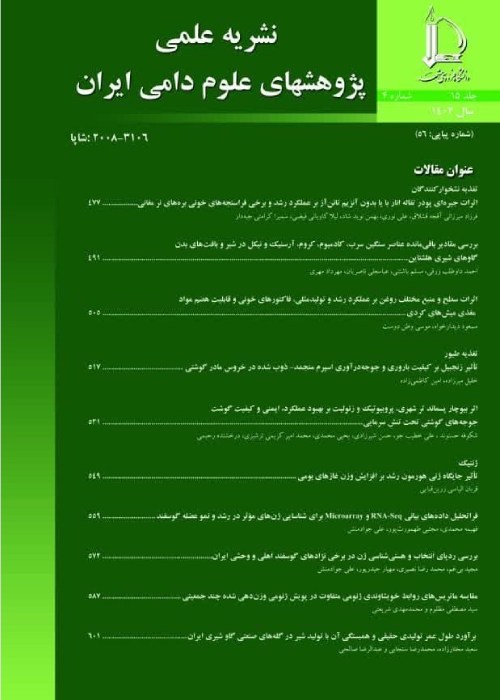The Effect of Thyme (Thymus vulgaris) on Growth Performance, Blood Metabolites, and Meat Quality of Broilers at High Stocking Density
In the broiler breeding industry, chickens are often reared in confinement at high stocking densities, which can make them susceptible to infectious diseases. Antibiotics, growth promoters, and anti-coccidial drugs are frequently used as feed additives to elevate growth rates, combat diseases, and lower losses. However frequent use of antibiotics in broiler diets may result in a rise in the antimicrobial resistance of both human and animal bacteria. Alternatives to antibiotics as growth promoters for broilers could decrease bacterial resistance to antibiotics, while at the same time maintaining growth and improving carcass composition. In addition, the bioactive components of herbal plants have a high free radical inhibitory activity that may help the endogenous oxidative status of animals and thus may prevent oxidation in meat and lead to improved meat quality. The objective of this study was to investigate the effect of thyme (Thymus vulgaris) on growth performance, blood metabolites, and meat quality of broilers at high stocking density.
This experiment was conducted based on a completely randomized design with a 2×2 factorial arrangements. A total of 216 1-d-old male broilers (Ross 308) were allotted to one of four treatments with four replicates. Two different stocking densities (low stocking density (LSD): 9 birds/m2 and high stocking density (HSD): 18 birds/m2) were tested with two different thyme levels: zero and 0.1%. Chickens had given ad-libitum access to water drinking and diet. At the end of the experiment (42 days old), two birds with the closest weights to the mean weight of the pen were selected, and after blood sampling slaughtered for determining meat quality. Body weight gain (BWG) and feed intake (FI) of birds were measured per pen at the end of each period. Mortality and the weight of birds that died or were culled during the experiment were recorded. Corrected feed conversion ratio was calculated based on mortality for these periods. Blood biochemical indices (glucose, cholesterol and triglyceride) were determined using a clinical biochemistry autoanalyzer using a kit from Pars Azmoun, Tehran, Iran. To determine the Water-holding capacity, 5 gr of breast sample were placed in filter paper and centrifuged at 1500×g for 4 min. Then the samples were placed in an oven at 70 °C for 24 h. Finally, the Water-holding capacity was calculated from the difference in the weight after centrifugation and the weight after drying, divided by the initial weight multiplied by 100. Collected data were subjected to ANOVA using the GLM procedure of SAS (SAS, 2005). Analysis of variance was performed using a completely randomized design with a factorial arrangement of treatments. Tukey’s multiple range test was used to determine differences among the treatment means. Statistical significance was considered at P<0.05.
The results showed that in the starter period, birds in the HSD group had the highest feed intake and weight gain compared to the LSD group (P<0.05). HSD caused a significant decrease in feed intake and body weight and a significant increase in feed conversion ratio in grower, finisher, and the total periods compared to LSD (P<0.05). A significant increase in glucose, heterophil concentration, and heterophil to lymphocyte ratio and a significant decrease in glutathione peroxidase and lymphocyte concentrations were observed in birds raised in HSD than LSD (P<0.05). Also, HSD decreased water holding capacity and increased cooking loss and dripping loss of breast meat (P<0.05). The addition of thyme powder increased feed intake and body weight and decreased feed conversion ratio in grower, finisher, and the total periods (P<0.05). The treatment containing thyme decreased the concentration of glucose, heterophil, and heterophil to lymphocyte ratio and increased the concentration of glutathione peroxidase, white blood cells, and lymphocytes (P<0.05). A significant increase in water holding capacity and a significant decrease in cooking loss, dripping loss, and thiobarbituric acid of breast meat were observed in the treatment containing thyme (P<0.05). The positive effects of thyme on reducing the negative effects of high stocking density and improving growth performance, antioxidant status, blood immunity, and meat quality of broilers could be due to its antioxidant and antibacterial properties. The improvement in the growth performance of broiler chickens caused by thyme could be partly attributed to its positive effect on nutrient digestibility. Furthermore, this positive result could be, at least in part, due to the antioxidant and antibacterial effects of herbal products in the gut.
Therefore, adding 1% thyme powder can reduce the negative effects of high stocking density on growth performance, and blood metabolites, and improve the meat quality of broilers raised under high stocking density.
- حق عضویت دریافتی صرف حمایت از نشریات عضو و نگهداری، تکمیل و توسعه مگیران میشود.
- پرداخت حق اشتراک و دانلود مقالات اجازه بازنشر آن در سایر رسانههای چاپی و دیجیتال را به کاربر نمیدهد.


